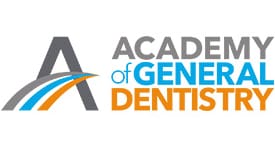
Kirkland Dentist Provides Compassionate Care
Kirkland Dentist is dedicated to providing you with an unparalleled dental experience, offering a comprehensive suite of services designed with your unique smile in mind.
At Juanita Bay Dentist, we know how daunting the quest for the perfect dentist can seem. You’re looking not only for expertise but also for a practice where you feel understood and cared for.
Explore our website and discover how we can illuminate your life with a brighter, healthier grin!


Meet Downing Moua, DMD
Raised in California, Dr. Moua first formed an interest in dentistry at the age of 7, from his brother-in-law, who is a dental technician. After three years of undergraduate education at the University of the Pacific, he continued on to study dentistry at Boston University, graduating with honors in 2003. A year later he completed his general practice residency in Fresno and then came to Kirkland to open his private practice.
Meet Dr. Michele Taylor
Dentistry has always been Dr. Taylor’s passion. She looks forward to establishing lifelong relationships and is truly thankful to her patients for placing their trust in her and her team.
Outside of the office, Dr. Taylor enjoys spending time with her family, working out, hiking, cycling, traveling, and playing with her three teacup Yorkies, Daisy, Dempsey, and Lily.

See the Difference!
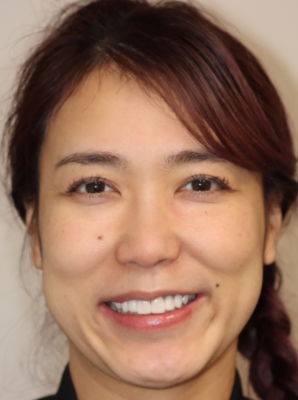
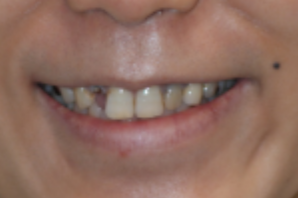
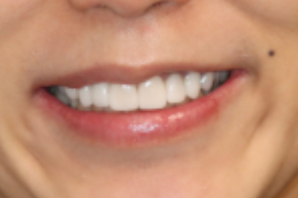

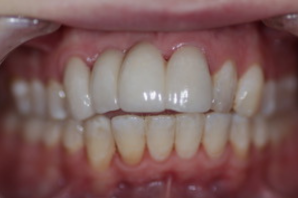
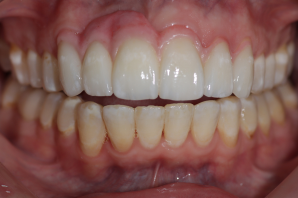


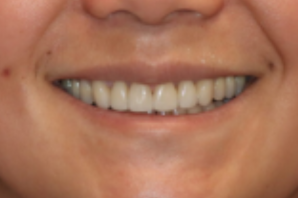
Kirkland Dentist Provides Comfortable Care for Anxious Patients
Whether you have had a bad experience in the past or just feel anxious about a certain procedure, we have measures that we can take to help you feel more relaxed. Our comfortable in-house sedation dentistry options safely put your mind at ease so that you can get through your next procedure, regardless of how complex your needs may be.
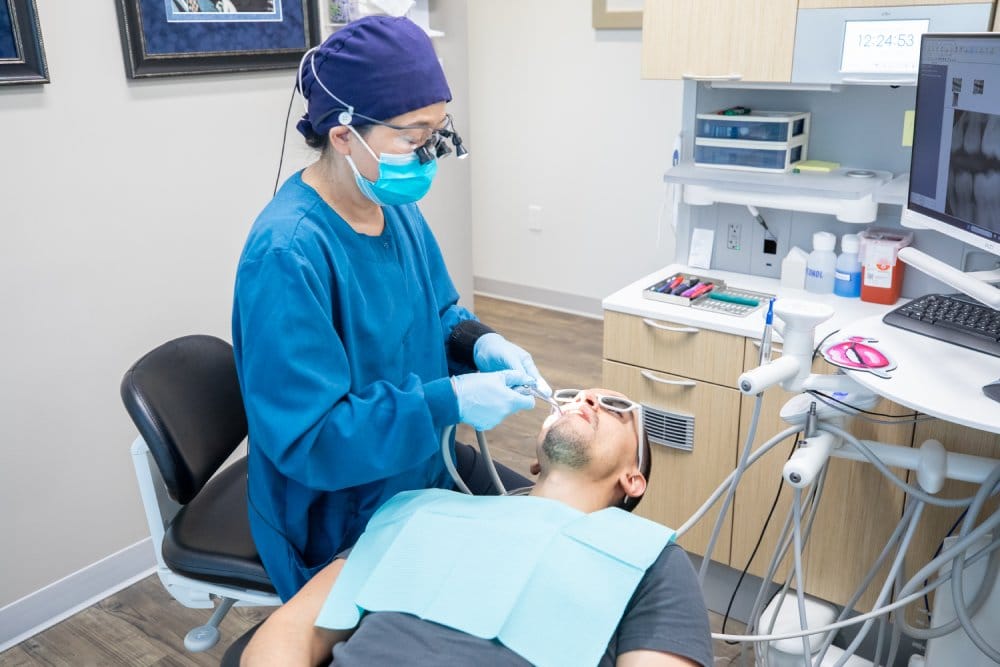
Our Kirkland Dentist Practices Trustworthy & Family Friendly Dentistry
Kirkland Dentist Dr. Downing Moua provides patient-centered care in a calm, lighthearted atmosphere. At Juanita Bay Dentist you’ll have access to staff who are not just providers but also your personal friends. Honesty and openness are a foundation to everything that we do.
Why We’re Different
We’re people pleasers. From treating you like one of our closest friends to taking as much time as necessary to see to your needs, our role in your smile’s health is extremely rewarding to us.
Each of our staff members is hand-selected for how well we work together and the vision that we share. We incorporate the Kois Dentistry methodology, which focuses on complete oral wellness. When you need care, we’ll explain the cause and effect of specific conditions, so that you can be well-informed of where your smile is headed in the future.
Comprehensive Dental Services Offered
From enhancing your smile with dental veneers to restoring broken teeth with porcelain crowns, we offer a wide menu of therapies to fit your lifestyle, preferences and budget. Our care coordinators will help you maximize your insurance benefits for necessary treatment, or walk you through affordable financing options when it comes to elective procedures.
You’ll find that we take the time to explain things, make sure you understand them and value your input. We might be the easiest office you’ve ever worked with.
- Dental Veneers
- Invisalign
- Crowns and Bridges
- Dental Implants
- Dentures
- Dental X-Rays
- Tooth Extraction
- Mouthguard

What are dental veneers?
Veneers transform smiles. They’re thin shells that cover the front of your teeth. They make your smile look better. We know how much a great smile matters to you.
How Professionals Apply Veneers
Experts make veneers from porcelain or resin. They stick them to your teeth permanently. A professional will prepare your teeth first. They’ll remove a tiny bit of enamel to make space. This helps the veneers look natural and fit well.
What Veneers Can Fix
Veneers fix many smile problems. They might be suggested for:
- Stained teeth that won’t whiten
- Chipped or worn teeth
- Crooked or oddly shaped teeth
- Spaces between teeth
- Teeth that look too big or small
How Long Veneers Last
Veneers can last many years if you take care of them. Regular check-ups help. Your bright smile will stay that way because veneers resist stains.
Getting Veneers That Fit You
Your dentist will work with you to get the right look. They’ll make sure your veneers match your face and give you the smile you want. This personal touch makes veneers special.
Why choose veneers?
Veneers offer many benefits:
- They don’t change your teeth much
- They look like real teeth
- The process is quick and usually painless
- You can pick the shape, size, and color
- They can make you feel more confident
What to Expect
A professional will guide you from start to finish. We’ll make sure you feel comfortable and know what’s happening. Your happiness matters to us.
Caring for Your Veneers
Keep brushing and flossing to make your veneers last. Regular check-ups help. This will keep your veneers and real teeth healthy.
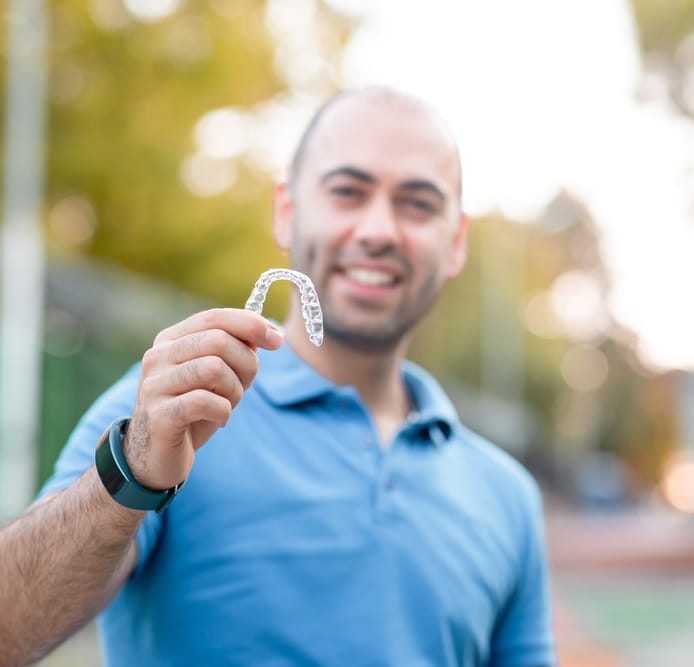
What is Invisalign?
Invisalign straightens teeth without metal braces. It uses clear, custom-made aligners. These fit snugly over your teeth and slowly move them into place. Many people prefer Invisalign because it’s barely noticeable. Your dentist can help you decide if Invisalign is right for you.
How Invisalign Works
Dentists create a series of aligners just for you. You wear each set for about two weeks. Then you switch to the next set. Each aligner moves your teeth a little more. The process continues until your teeth reach their ideal position.
What Invisalign Can Fix
Invisalign treats many teeth alignment issues. Your dentist might recommend it for:
- Crowded teeth
- Gaps between teeth
- Overbites
- Underbites
- Crossbites
How Long Invisalign Takes
Treatment time varies. Most people wear Invisalign for 12 to 18 months. Your exact time depends on your teeth. Some people see results in just a few months. Your dentist will give you a more precise estimate.
Getting Started with Invisalign
Your dentist will scan your teeth. They use special software to plan your treatment. You’ll see a preview of your new smile before you start. This helps you know what to expect.
Why choose Invisalign?
Invisalign offers several benefits:
- The aligners are nearly invisible
- You can remove them to eat and clean your teeth
- They’re more comfortable than traditional braces
- You need fewer dentist visits
- You can see your progress as you go
What to Expect
You’ll wear your aligners 20 to 22 hours a day. You take them out to eat, drink, brush, and floss. You’ll switch to new aligners every two weeks. Regular check-ups with your dentist ensure your treatment stays on track.
Caring for Your Aligners
Clean your aligners daily. Rinse them when you remove them. Brush them gently with a soft toothbrush. Keep them in their case when not in use. This helps them stay clean and clear. Your dentist can give you more tips on aligner care.

What are dental crowns and bridges?
Dental crowns and bridges restore damaged teeth. Crowns cover entire teeth, while bridges replace missing ones. Your dentist uses these to improve your smile and bite. They’re custom-made to fit your mouth perfectly.
How Dentists Apply Crowns and Bridges
Your dentist prepares your teeth first. For crowns, they reshape the tooth. For bridges, they prepare nearby teeth to support the bridge. Then they take impressions. A lab makes your crown or bridge. Your dentist fits and cements it in place.
What Crowns and Bridges Can Fix
Dentists use crowns and bridges for various issues:
- Severely decayed teeth
- Cracked or broken teeth
- Misshapen teeth
- Gaps from missing teeth
- Weak teeth that need protection
How Long Crowns and Bridges Last
With proper care, crowns and bridges can last many years. Your dentist will check them during regular visits. Good oral hygiene helps them last longer. Some may need replacement after 5-15 years.
Getting Crowns or Bridges That Fit You
Your dentist will match the color to your other teeth. They ensure the crown or bridge fits comfortably. This process may take a few visits. The result is a natural-looking, functional restoration.
Why choose crowns or bridges?
Crowns and bridges offer several benefits:
- They restore your smile’s appearance
- They improve chewing and speaking
- They prevent teeth from shifting
- They’re durable and long-lasting
- They can boost your confidence
What to Expect
Your dentist will explain the process step-by-step. They may use a temporary crown or bridge while the permanent one is made. You might feel some sensitivity at first, but this usually fades quickly.
Caring for Your Crowns and Bridges
Brush and floss regularly, paying extra attention to the crowned or bridged area. Avoid chewing very hard foods. Visit your dentist for regular check-ups. They’ll make sure your crowns or bridges stay in good condition.
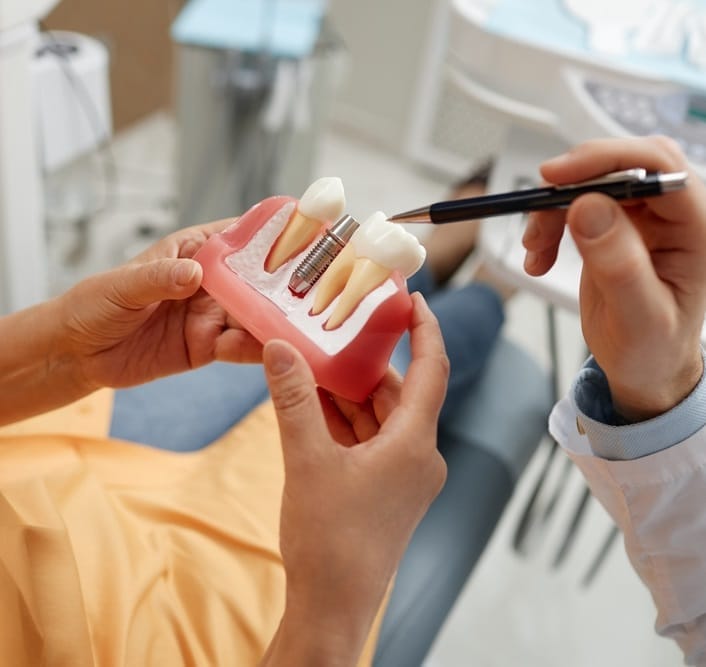
What are dental implants?
Dental implants replace missing teeth. They’re artificial roots your dentist places in your jawbone. These roots support replacement teeth. Implants look and feel like natural teeth. They’re a long-lasting solution for tooth loss.
How Dentists Place Implants
Your dentist surgically places the implant in your jawbone. It’s usually made of titanium. Over time, the implant fuses with your bone. This process is called osseointegration. Once healed, your dentist attaches an artificial tooth to the implant.
What Dental Implants Can Fix
Dentists recommend implants for various reasons:
- Replacing single missing teeth
- Supporting bridges for multiple missing teeth
- Securing dentures
- Restoring ability to chew and speak clearly
- Preventing bone loss in the jaw
How Long Dental Implants Last
Implants can last a lifetime with proper care. The artificial tooth might need replacement after 10-15 years. Your dentist will check your implants during regular visits. Good oral hygiene is crucial for their longevity.
Getting Implants That Fit You
Your dentist will assess your oral health and jawbone density. They’ll create a personalized treatment plan. The process may take several months. The result is a strong, natural-looking tooth replacement.
Why choose dental implants?
Implants offer many advantages:
- They look and feel like natural teeth
- They’re permanent and stable
- They prevent bone loss in the jaw
- They don’t affect nearby healthy teeth
- They can improve your smile and confidence
What to Expect
Your dentist will explain each step of the process. You might need bone grafting if your jawbone isn’t thick enough. After implant placement, you’ll wait for it to heal before getting the artificial tooth. Some discomfort is normal but manageable.
Caring for Your Dental Implants
Brush and floss your implants like natural teeth. Use a soft toothbrush and non-abrasive toothpaste. Visit your dentist regularly for check-ups. Avoid smoking as it can affect implant success. With proper care, your implants can last a lifetime.
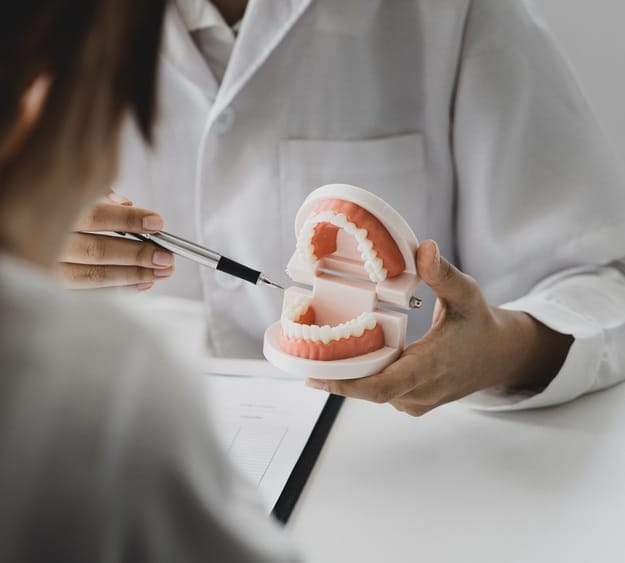
What are dentures?
Dentures are removable replacements for missing teeth. Your dentist can fit you with full or partial dentures. They restore your smile and help you eat and speak. Modern dentures look natural and fit comfortably.
How Dentists Create Dentures
Your dentist takes impressions of your mouth. They use these to make custom dentures. The process may involve several fittings. Your dentist ensures the dentures fit well and look natural. They’ll make adjustments as needed for your comfort.
What Dentures Can Fix
Dentists recommend dentures for various reasons:
- Replacing all teeth in upper or lower jaw
- Filling gaps from multiple missing teeth
- Improving ability to eat and speak
- Supporting facial muscles
- Boosting confidence in your smile
How Long Dentures Last
With proper care, dentures can last 5-10 years. Your dentist will check them during regular visits. They might need adjustments or replacement as your mouth changes over time. Good hygiene helps extend their life.
Getting Dentures That Fit You
Your dentist will discuss your options. They’ll consider your oral health and preferences. The process involves several steps. You might need some teeth removed before getting dentures. Your dentist will guide you through each stage.
Why choose dentures?
Dentures offer several benefits:
- They’re less expensive than some alternatives
- The process is non-invasive
- They’re easy to clean and maintain
- They can be made quickly
- They can improve your appearance and self-esteem
What to Expect
Your dentist will explain how to wear and care for your dentures. It may take time to get used to them. Eating and speaking might feel different at first. Be patient and practice. Your dentist can help if you have any issues.
Caring for Your Dentures
Clean your dentures daily. Use a soft brush and denture cleaner. Soak them overnight in water or a special solution. Handle them carefully to avoid breaks. Visit your dentist regularly for check-ups and adjustments. Good care keeps your dentures and mouth healthy.
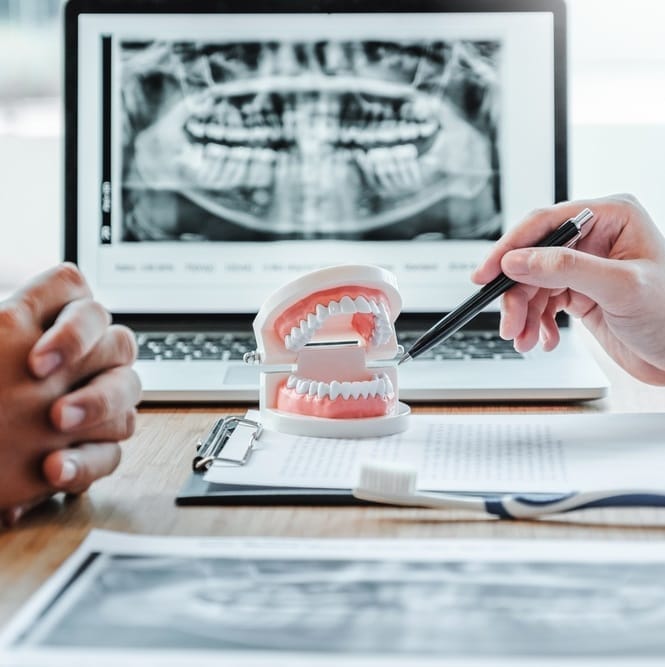
What are dental x-rays?
Dental x-rays are images of your teeth and gums. They help your dentist see what’s not visible to the naked eye. These images show cavities, bone loss, and hidden dental structures. They’re a crucial tool for diagnosing and planning treatments.
How Dentists Take X-rays
Your dentist or a dental technician takes x-rays. They place a small sensor in your mouth. Then, they aim the x-ray machine at the area. It only takes seconds to capture an image. The process is quick and painless. Your dentist can view the images immediately on a computer screen.
What Dental X-rays Can Reveal
Dentists use x-rays to detect various issues:
- Hidden decay between teeth
- Bone loss from gum disease
- Abscesses or cysts
- Impacted teeth
- Abnormal growths
How Often You Need X-rays
The frequency depends on your oral health. Your dentist might recommend x-rays yearly or every few years. New patients often need a full set. Children may need them more often as their teeth develop. Your dentist will explain why and when you need x-rays.
Getting Safe Dental X-rays
Your dentist uses modern, low-radiation machines. They cover you with a lead apron for extra protection. Digital x-rays use even less radiation than traditional film. The benefits of early detection outweigh the very low risks. Your dentist prioritizes your safety.
Why choose dental x-rays?
X-rays offer several benefits:
- They catch problems early
- They help plan treatments accurately
- They save time and money in the long run
- They’re essential for some procedures
- They create a record of your dental health
What to Expect
The x-ray process is quick and easy. You might need to bite down on a small piece of plastic. Your dentist will position the sensor and machine. You’ll hear a brief beep when the image is taken. It’s over in seconds.
Understanding Your X-rays
Your dentist will explain what your x-rays show. They use them to plan your care. Don’t hesitate to ask questions. Understanding your x-rays helps you make informed decisions about your dental health. Regular x-rays are a key part of preventive dental care.

What is a tooth extraction?
A tooth extraction is when your dentist removes a tooth from its socket in the bone. It’s usually done when a tooth is too damaged to repair. Your dentist might recommend it for severe decay, infection, or overcrowding. It’s a common dental procedure that can improve your overall oral health.
Types of Therapies Used with Tooth Extraction
Your dentist uses different techniques for extraction:
- Simple extraction for visible teeth
- Surgical extraction for teeth under the gum
- Wisdom tooth removal
- Multiple tooth extraction
- Immediate implant placement after extraction
Complications and Implications Associated with Tooth Extraction
While generally safe, extractions can have some risks:
- Dry socket (when the blood clot dislodges)
- Infection at the extraction site
- Damage to nearby teeth or jaw
- Sinus problems with upper teeth
- Prolonged bleeding or swelling
Your dentist will explain how to prevent these issues.
The Future of Tooth Extraction in Healthcare
Dentists are always improving extraction techniques. New tools make the process faster and more comfortable. Some dentists use lasers for certain extractions. 3D imaging helps plan complex cases. Your dentist stays updated on these advancements to provide the best care.
How Tooth Extraction Supports Recovery
Sometimes, removing a tooth is the best way to heal. It can:
- Stop the spread of infection
- Relieve pain from decay or damage
- Make room for orthodontic treatment
- Prepare for dentures or implants
- Improve overall mouth health
Your dentist will explain how extraction fits into your treatment plan.
Comparing Tooth Extraction with Traditional Methods
In the past, dentists tried to save every tooth. Now, we know sometimes extraction is better. It’s often quicker and more effective than multiple treatments on a badly damaged tooth. Your dentist will discuss all options with you.
The Role of Tooth Extraction in Modern Dentistry
Extraction is an important tool in dental care. It’s not just about removing problem teeth. It’s part of broader treatment plans. Your dentist might use it to prepare for implants or braces. It can be a step towards a healthier, more comfortable mouth.

What is a mouthguard?
A mouthguard is a protective device for your teeth and gums. It’s a flexible cover that fits over your teeth. Your dentist can create a custom mouthguard for the best fit. People use them for sports, teeth grinding, and other dental issues. They help prevent injuries and reduce wear on your teeth.
How Dentists Create Mouthguards
Your dentist makes custom mouthguards using impressions of your teeth. They might use digital scans or traditional molds. The mouthguard material is then shaped to fit your teeth perfectly, ensuring maximum protection and comfort. Your dentist will adjust the fit as needed.
What Mouthguards Can Protect Against
Dentists recommend mouthguards for various reasons:
- Sports-related dental injuries
- Nighttime teeth grinding (bruxism)
- Jaw joint pain (TMJ disorders)
- Protecting dental work
- Reducing impact during falls or accidents
How Long Mouthguards Last
With proper care, a mouthguard can last 6 months to several years. Your dentist will advise when to replace it. Factors like wear, teeth changes, and usage frequency affect its lifespan. Regular dental check-ups help ensure your mouthguard remains effective.
Getting a Mouthguard That Fits You
Your dentist will assess your needs and recommend the best type of mouthguard. They might suggest a custom-made guard for the best fit and protection. The process is quick and comfortable. Your dentist ensures the mouthguard doesn’t interfere with speaking or breathing.
Why choose a professional mouthguard?
Dentist-provided mouthguards offer several benefits:
- Custom-fit for maximum protection
- High-quality, durable materials
- Professional assessment of your needs
- Adjustments for perfect comfort
- Regular check-ups to ensure effectiveness
What to Expect When Getting a Mouthguard
Your dentist will explain the process step-by-step. They might take impressions or scans of your teeth. You’ll have a fitting appointment to ensure the mouthguard fits well. Your dentist will show you how to properly use and care for your mouthguard.
Caring for Your Mouthguard
Regularly brush it with a toothbrush and toothpaste to remove bacteria and debris. Always store your mouthguard in a clean, ventilated container to prevent bacterial growth. Keep it away from heat sources, as high temperatures can warp the material and affect its fit. Remember to bring your mouthguard to your dental appointments. Your dentist will check its condition and fit, ensuring it provides optimal protection.
Why choose Juanita Bay Dentist?
High-Quality Dental Services
Our dental practice is committed to providing high-quality dental services. From routine teeth cleanings to advanced procedures like dental implants and veneers, we prioritize excellence in every aspect of our dental care.
Our experienced team ensures that each patient receives personalized attention and top-notch treatment for their unique oral health needs. With a focus on quality, we strive to deliver exceptional results and ensure the satisfaction of every patient who walks through our doors.
Experienced and Professional Staff
Our dental practice is staffed with experienced and professional individuals who are dedicated to providing top-notch care. Each member of our team is highly trained and skilled in their respective roles, ensuring that you receive the best possible treatment during your visit.
We take pride in maintaining a welcoming environment where you can feel comfortable and confident in the expertise of our staff. Our team’s collective experience allows us to address various dental needs with precision, compassion, and efficiency.
Convenient Payment Options
We accept cash, debit cards, Visa, MasterCard, and checks with valid ID. In addition to these traditional payment methods, we also offer CareCredit and Cherry for your convenience.
Our goal is to provide accessible and hassle-free payment solutions for our patients.
Accessibility to Surrounding Areas
Convenient payment options make our dental office easily accessible to residents of Seattle, Kirkland, Bothell, Redmond, Woodinville, and other nearby areas. Our central location ensures hassle-free access for patients from surrounding communities such as Kenmore, Duval, Lynnwood, Edmond and Bellevue.
Whether you’re coming from Seattle or anywhere else in the vicinity, our dental office is conveniently situated to meet your accessibility needs.
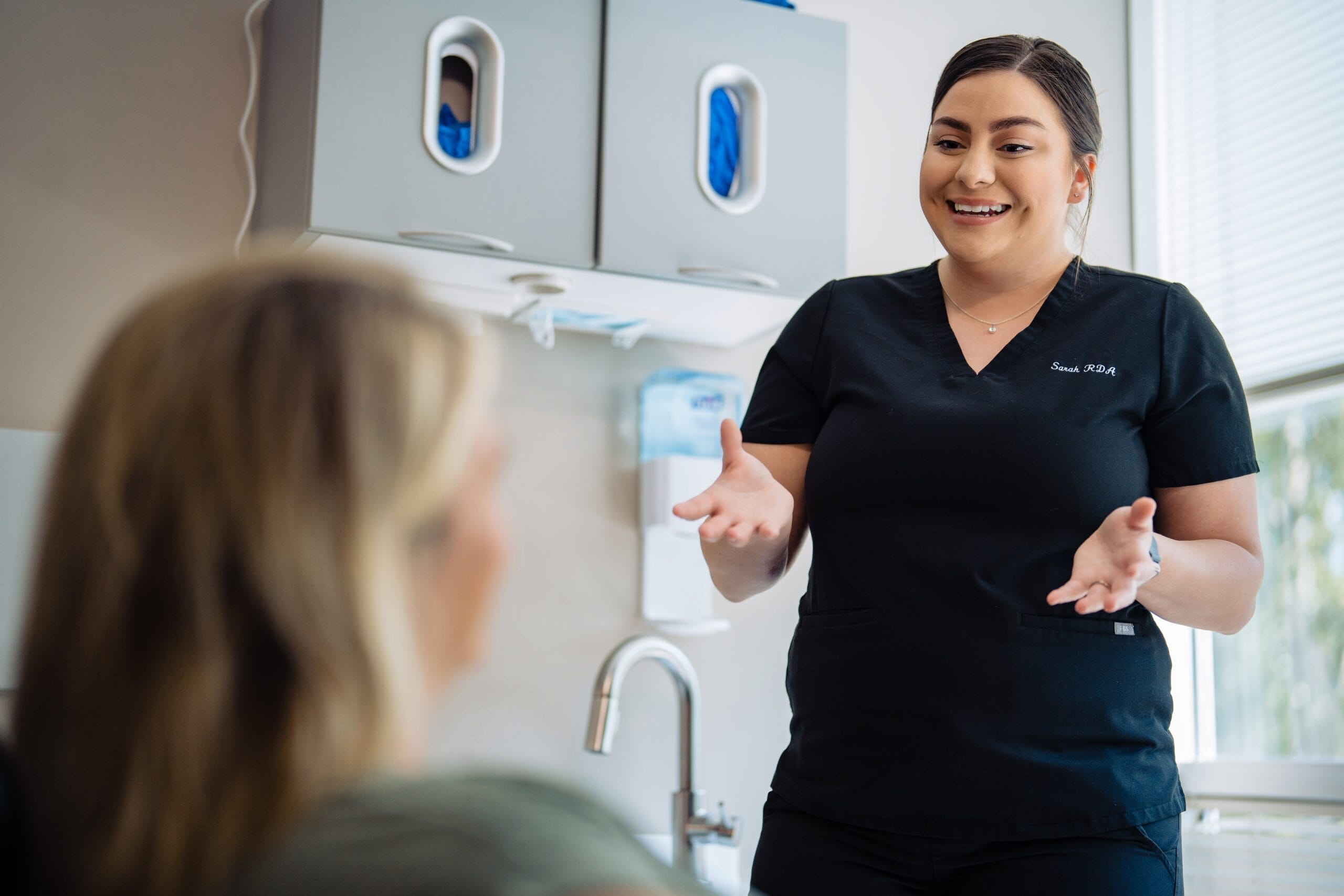

Schedule your appointment with our dentist today!
Schedule your dental appointment at Juanita Bay Dentist today and take the first step towards a healthy smile. Our friendly staff is ready to assist you in finding a convenient time for your visit.
Join us at Juanita Bay Dentist for professional dental services in Kirkland and its surrounding areas.
FAQs
Do you accept appointments?
Absolutely! We encourage our patients to schedule appointments in advance to ensure timely and efficient care. Booking ahead helps us allocate dedicated time for your dental needs, ensuring the best possible care for you.
Do I need to arrive early for my first appointment?
For your first appointment, kindly arrive 10-15 minutes early. This allows you enough time to complete any necessary patient forms, ensuring that your appointment proceeds smoothly.
What forms of payment do you accept?
We accept various forms of payment for your convenience, including checks, cash, and credit cards.
We also accept most insurance plans. If you have any questions about insurance, please contact our office or visit our Payment Options page for comprehensive details.
How often should I visit the dentist?
Maintaining good oral health requires routine dental check-ups and cleanings. Following the American Dental Association’s guidelines, we recommend visiting the dentist at least once every six months. Scheduling regular visits is crucial for optimal oral health. Reach out to us today to set up your next appointment!
What services do you offer?
We pride ourselves on offering a comprehensive range of dental services to cater to the varied needs of our patients. Our services include, but are not limited to:



